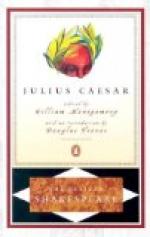|
This section contains 3,759 words (approx. 13 pages at 300 words per page) |

|
SOURCE: Taylor, Myron. “Shakespeare's Julius Caesar and the Irony of History.” Shakespeare Quarterly 24, no. 3 (summer 1973): 301-08.
In the following essay, Taylor regards Julius Caesar as a drama concerned with clashing philosophical perspectives: the Epicurean philosophy of Cassius and the superstitious worldview of Caesar.
Plutarch's account of the death of Julius Caesar at the hands of the republican conspirators Brutus and Cassius provided Shakespeare with a story ideally suited to his dramatic intents. In general politically neutral, the story as Plutarch recounted it contained many examples of supernatural phenomena commenting upon political events. In addition, Plutarch underscored the ironic implications in the actions of the plotters: in trying to end the tyranny of Caesar, they succeeded only in creating the worse tyranny of the Triumvirate. Ultimately the very swords that they had used against Caesar were conveyed into their own bosoms. In words drawn from Hamlet, the “enginer [was...
|
This section contains 3,759 words (approx. 13 pages at 300 words per page) |

|


